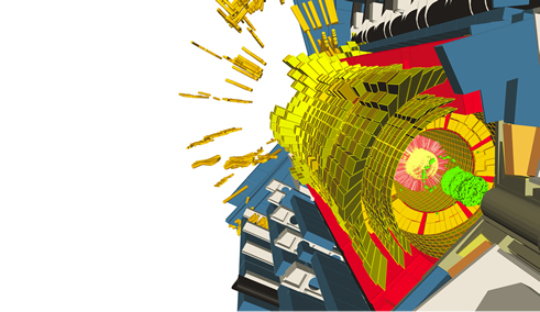
The official launch of a new national research network dedicated to understanding some of the universe's deepest mysteries has recruited six particle physicists out of the Department of Physics.
With CFREF funding from the McDonald Institute, the University of Alberta has hired two new physics faculty-Marie-Cécile Piro and Juan Pablo Yanez-who join Darren Grant, Aksel Hallin, Claudio Kopper, and Carsten Krauss at the University of Alberta's Centre for Particle Physics to be part of the new Arthur B. McDonald Canadian Astroparticle Physics Research Institute.
Advancing astroparticle physics in Canada
The Arthur B. McDonald Canadian Astroparticle Physics Research Institute, formerly known as the Canadian Particle Astrophysics Research Centre (CPARC), is a partnership of eight universities and five affiliated research organizations that are active in astroparticle physics research. The institute came to fruition as a result of the $63.7 million investment received in 2016 from the Government of Canada's Canada First Research Excellence Fund (CFREF).
The overarching goal of the institute is to create an ecosystem of international excellence and to produce world-leading advances in low background and detector development, such that the international community will rally around the opportunities to advance astroparticle physics experiments and knowledge in Canada.
UAlberta's long-standing tradition
The Department of Physics has long been in the particle physics game. The experimental subatomic physics program at the University of Alberta dates back to 1958, with the establishment of the Nuclear Research Centre and a focus on nuclear physics using its in-house Van de Graff particle accelerator. As research increasingly focused on higher-energy physics, the centre was renamed the Centre for Subatomic Research in 1992. Members of the centre were instrumental in designing and building parts of the ATLAS detector at CERN.
In 2006, the Centre for Particle Physics at the University of Alberta gained its current name, reflecting a further expansion of the research program to promote interaction and collaboration among researchers in nuclear, particle and astroparticle physics research. Experimental groups at the University of Alberta are part of the international IceCube, PINGU, ATLAS, SNO+, DEAP, PICO and MoEDAL collaborations. These experiments are studying neutrino physics, Higgs and black hole physics, as well as searching for dark matter and magnetic monopoles. Theorists at the university work on precision models for the next generation of experiments searching for new physics.
The physics community - where everything is possible
Marie-Cecile Piro, Assistant Professor, Physics, spoke on behalf of the new faculty members involved in the Institute. Read the full text of her speech below.
Hello, bonjour everyone,
It's a great pleasure for me to be here and to have the chance to share with you my new experience of life and what the McDonald Institute has brought to me.
Before getting the position at the University of Alberta, I was a postdoc for few years in different countries. Always moving, always traveling, always on the go. My friends always named me " The globe trotter", never at the same place.
Thanks to the McDonald Institute, I had the possibility to return in Canada where I did all my bachelor studies in Physics at Université de Montréal and where also I completed my master's thesis and PhD. After working in a few places around the world (France, Japan, Italy, US) I really would like returning to Canada, because working in Canada, living in Canada, was my best experience in physics and in life. People, life style, mentality, personality correspond perfectly to my thoughts, and we accomplished also great work for the research in physics. I really couldn't imagine that I could have the chance one day to go back to Canada and have the possibility to get a faculty position here. It was unimaginable. But thanks to the McDonald Institute, it was possible.
To be honest, I was not sure if I would like to settle down and have a position at the beginning. But because all of these positions opened with a good timing for me, it gave me the possibility to return to Canada where also my family is living, especially Montréal. That was also my first experience applying to faculty position, and I applied everywhere (Queen's, Carleton, University of Alberta, Montréal, Sudbury). My first application and interview was at University of Alberta. It was one of the greatest experiences of my life. All the people I met, the Faculty of Science, and the research conducted there were wonderful and so diverse. On top of that, Edmonton is a very beautiful city, and I really felt welcomed everywhere. What also impressed me is how many facilities and resources the University of Alberta offers to the students, to the researcher, to the departments in a very nice environment. The building of science is brand new, and the quality of life is really exceptional. I wish for every one of you to have the chance to visit this very nice city and the unique environment at the University of Alberta.
I started eight months ago at University of Alberta, and I am so fulfilled. It was the best decision of my life. More and more I know my new environment, and more and more I love it. The team and the department at University of Alberta are so nice and so welcoming that I felt really immediately in my element. Thanks to The McDonald institute, it makes it possible to realize my dreams and allows me to have a strong impact in the particle physics community-working with first class physicists and feeling accomplished. Thanks to the McDonald Institute, I can make a real impact on the physics community, where everything is possible. Thank you, merci the McDonald Institute!
The launch event was available to watch via livestream at 8:30 am MDT, Thursday May 10th.